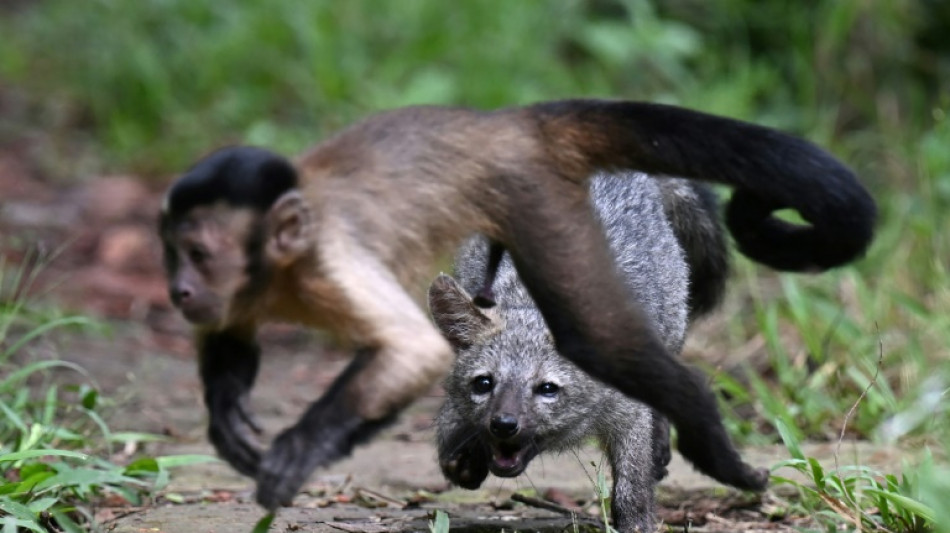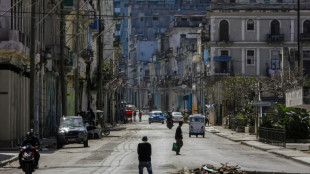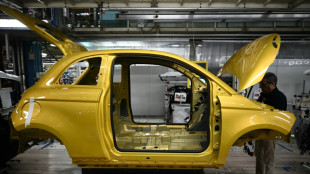
-
 What next for Vonn after painful end to Olympic dream?
What next for Vonn after painful end to Olympic dream?
-
Main trial begins in landmark US addiction case against Meta, YouTube

-
 South Africa open T20 World Cup campaign with Canada thrashing
South Africa open T20 World Cup campaign with Canada thrashing
-
Epstein accomplice Maxwell seeks Trump clemency before testimony

-
 Discord adopts facial recognition in child safety crackdown
Discord adopts facial recognition in child safety crackdown
-
Some striking NY nurses reach deal with employers

-
 Emergency measures kick in as Cuban fuel supplies dwindle under US pressure
Emergency measures kick in as Cuban fuel supplies dwindle under US pressure
-
EU chief backs Made-in-Europe push for 'strategic' sectors

-
 Machado ally 'kidnapped' after calling for Venezuela elections
Machado ally 'kidnapped' after calling for Venezuela elections
-
Epstein affair triggers crisis of trust in Norway

-
 AI chatbots give bad health advice, research finds
AI chatbots give bad health advice, research finds
-
Iran steps up arrests while remaining positive on US talks

-
 Frank issues rallying cry for 'desperate' Tottenham
Frank issues rallying cry for 'desperate' Tottenham
-
South Africa pile up 213-4 against Canada in T20 World Cup

-
 Brazil seeks to restore block of Rumble video app
Brazil seeks to restore block of Rumble video app
-
Gu's hopes of Olympic triple gold dashed, Vonn still in hospital

-
 Pressure mounts on UK's Starmer as Scottish Labour leader urges him to quit
Pressure mounts on UK's Starmer as Scottish Labour leader urges him to quit
-
Macron backs ripping up vines as French wine sales dive

-
 Olympic freeski star Eileen Gu 'carrying weight of two countries'
Olympic freeski star Eileen Gu 'carrying weight of two countries'
-
Bank of France governor Francois Villeroy de Galhau to step down in June

-
 Tokyo stocks strike record high after Japanese premier wins vote
Tokyo stocks strike record high after Japanese premier wins vote
-
'I need to improve', says Haaland after barren spell

-
 Italian suspect questioned over Sarajevo 'weekend snipers' killings: reports
Italian suspect questioned over Sarajevo 'weekend snipers' killings: reports
-
Von Allmen at the double as Nef seals Olympic team combined gold

-
 Newlyweds, but rivals, as Olympic duo pursue skeleton dreams
Newlyweds, but rivals, as Olympic duo pursue skeleton dreams
-
Carrick sees 'a lot more to do' to earn Man Utd job

-
 Olympic star Chloe Kim calls for 'compassion' after Trump attack on US teammate
Olympic star Chloe Kim calls for 'compassion' after Trump attack on US teammate
-
'All the pressure' on Pakistan as USA out to inflict another T20 shock

-
 Starmer vows to remain as UK PM amid Epstein fallout
Starmer vows to remain as UK PM amid Epstein fallout
-
Howe would 'step aside' if right for Newcastle

-
 Sakamoto wants 'no regrets' as gold beckons in Olympic finale
Sakamoto wants 'no regrets' as gold beckons in Olympic finale
-
What next for Vonn after painful end of Olympic dream?

-
 Brain training reduces dementia risk by 25%, study finds
Brain training reduces dementia risk by 25%, study finds
-
Gremaud ends Gu's hopes of Olympic treble in freeski slopestyle

-
 Shiffrin and Johnson paired in Winter Olympics team combined
Shiffrin and Johnson paired in Winter Olympics team combined
-
UK's Starmer scrambles to limit Epstein fallout as aides quit

-
 US skater Malinin 'full of confidence' after first Olympic gold
US skater Malinin 'full of confidence' after first Olympic gold
-
Sydney police pepper spray protesters during rallies against Israeli president's visit

-
 Israel says killed four militants exiting Gaza tunnel
Israel says killed four militants exiting Gaza tunnel
-
Franzoni sets pace in Olympic team combined

-
 Captain's injury agony mars 'emotional' Italy debut at T20 World Cup
Captain's injury agony mars 'emotional' Italy debut at T20 World Cup
-
Family matters: Thaksin's party down, maybe not out

-
 African players in Europe: Ouattara fires another winner for Bees
African players in Europe: Ouattara fires another winner for Bees
-
Pressure grows on UK's Starmer over Epstein fallout

-
 Music world mourns Ghana's Ebo Taylor, founding father of highlife
Music world mourns Ghana's Ebo Taylor, founding father of highlife
-
HK mogul's ex-workers 'broke down in tears' as they watched sentencing

-
 JD Vance set for Armenia, Azerbaijan trip
JD Vance set for Armenia, Azerbaijan trip
-
Sydney police deploy pepper spray as Israeli president's visit sparks protests

-
 EU warns Meta it must open up WhatsApp to rival AI chatbots
EU warns Meta it must open up WhatsApp to rival AI chatbots
-
Scotland spoil Italy's T20 World Cup debut with big win

| CMSC | -0.05% | 23.56 | $ | |
| SCS | 0.12% | 16.14 | $ | |
| BCC | -0.67% | 90.42 | $ | |
| JRI | -0.78% | 12.87 | $ | |
| BTI | -3.24% | 60.83 | $ | |
| NGG | -0.19% | 87.89 | $ | |
| GSK | -2.32% | 58.865 | $ | |
| BCE | 1.45% | 25.45 | $ | |
| AZN | -2.28% | 188.72 | $ | |
| RIO | 3.06% | 96.36 | $ | |
| RBGPF | 0.12% | 82.5 | $ | |
| RYCEF | 2.65% | 17.34 | $ | |
| CMSD | 0.13% | 23.98 | $ | |
| BP | 0.55% | 39.225 | $ | |
| RELX | -0.72% | 29.17 | $ | |
| VOD | 2.17% | 15.445 | $ |

Repentant ranchers rescuing Colombian wildlife
Two newborn pumas and a convalescing porcupine share a room in the home of the Zapata family, which has renounced livestock farming to focus on stewardship of the Colombian Amazon and its animals uprooted by deforestation.
Just over a decade ago, the Zapatas decided to change their ways, and instead of cutting back trees for pasture, plant new ones.
They sold their cows and let the jungle claim back most of their land in San Jose de Guaviare in southern Colombia.
Today, the family of three work to rehabilitate animals affected in a variety of cruel ways by humanity's encroachment on nature.
They sacrificed part of their home and backyard, where for the moment they house 60 creatures, ranging from monkeys, birds and armadillos to a spotted wild cat known as an ocelot.
"This farm was dedicated to cattle raising: 56 hectares of which only about 12 (hectares) were... forest," said Dora Sanchez, who runs the ranch-turned-reserve with husband Hector Zapata, 57, and daughter Samantha, 23.
"Little by little, my family understood that (conservation) is a good thing," the 48-year-old told AFP on the former ranch now called the Nupana reserve.
"We must preserve and protect the forest, because it is the source of life... We are one hundred percent convinced that it is the jungle" that is the future, she added.
- 'Positive effect' -
Like many others in this rural department of Guaviare, the Zapatas were attracted by the dream of making a new life in a "land without men for men without land."
When Sanchez and Zapata moved there in 1997, most of the locals were raising cattle or planting coca -- the raw ingredient of cocaine, of which Colombia is the world's main producer.
Both cattle and cocaine are jungle killers and Guaviare lost some 25,000 hectares of forest just in 2021, according to authorities.
The family raised cattle for 15 years before deciding this was no longer for them. By 2012, the last cows left the farm.
"I began to do some experiments, to set up agroforestry systems and we began to see the positive effect," said Sanchez, an agroforestry engineer by training.
"The forest began to change, the fauna began to return. We improved the water conditions and the soil began to improve."
Today, the reserve has 40 hectares of jungle, said Sanchez, and tourists visit its eco trail. Some "adopt" an animal and make monthly contributions for its upkeep.
Baby animals are cared for in the family house.
Roaming free on the property, a small grey fox and a capuchin monkey that lost a leg chase each other around playfully -- among the animals too domesticated or weak to return to the wild.
Other, more potentially dangerous creatures, must live out their days in enclosures "because they do not have the necessary skills, they cannot survive, they do not recognize that a predator can attack them," said Samantha Zapata, an agronomy student.
Some of the animals at the reserve had been confiscated from people who kept them as pets or tried to sell them.
Others were found injured or abandoned in the ever-shrinking Amazon.
The Zapatas keep the wild animals separately in cages, giving them medicine and food to get them back on their feet and hopefully back to the wild.
"There are many challenges, because each animal has its own characteristics and behavior," said Hector Zapata, adding they had learnt a lot through practical experience.
"Taking care of them, guiding them step by step to a... release, I think is one of the most difficult challenges we have."
- Learn to hunt -
Samantha bottle feeds the baby pumas with mixed emotions.
"They are very beautiful and we would normally never have been able to see them so close, but it is sad because (people) killed their mother," she said.
The cubs were rescued by the CDA environmental agency and brought to the ranch after a citizen reported them abandoned in the jungle, their eyes closed and with their umbilical cords still attached.
Locals told the CDA some farmers had been killing wild cats in the area to protect their sheep.
"At the age of four, five months we will begin to give them meat... and live prey so that they can learn to hunt and can develop naturally," said Samantha Zapata.
Hopefully, "they will not be condemned to living in a cage."
P.Costa--AMWN


